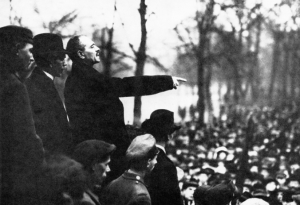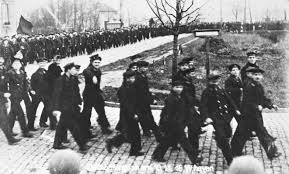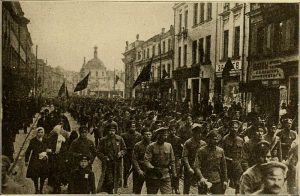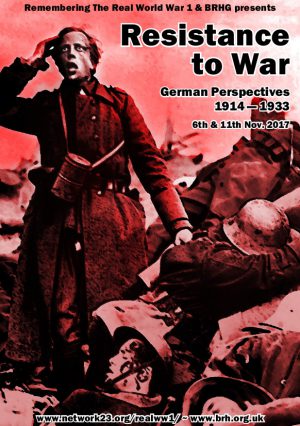An afternoon of talks looking at events in Germany during and after World War 1.
Date: Saturday November 11th 2017
Venue: Studio 1, M Shed, Princes Wharf, Wapping Rd, Bristol BS1 4RN
Time: 1:30pm to 4:45pm
Getting there: https://www.bristolmuseums.org.uk/m-shed/getting-here/#on-foot
On November 11th, Armistice Day, nearly 100 years after the First World war ended, we traditionally mourn the British and allied dead. In fact, the war was a tragedy for all the peoples who took part and we should mourn all those who died.
In Britain, the remembrance ceremonies are accompanied by military parades which glamorise war. By implication, the sacrifices of previous generations are presented as an example to be followed by the present generation in the next war. This is a powerful and abiding idea, deep in the British psyche. In modern Europe with nations at peace with each other since 1945, this seems completely inappropriate and dangerous.
There were people on both sides who opposed the war at the time and said it was a waste of human life and resources. This November 11th, Remembering The Real World War 1 brings you three talks telling the little-known story of some of those Germans who opposed war between 1914 and 1933.
For more information email rememberingrealww1@gmail.com

Making a stand: German opposition to World War One
Speaker: Ingrid Sharpe
During and after the First World War, ‘German’ and ‘Germany’ became bywords for militarism and a hundred years later commemoration of the First World War centenary can sometimes give the impression that the war was accepted without opposition in Germany, and that the First World War was fought without any dissenting German voices. This talk will look beyond German militarism at the various forms of anti-war resistance practiced by German citizens, including those conscripted into the German army.
Before the war, there were social, political and religious forces against militarism that were largely suppressed but not destroyed by military censorship. The terrible experience of war also created new opposition among the scientists, politicians and soldiers who participated in it and a small but determined minority within the organised women’s movement formed international links across enemy lines to speak out against the war and to influence the peace processes.
Ingrid Sharpe is Professor of German Cultural and Gender History at the University of Leeds, with a particular research emphasis on the First World War and Weimar Germany. She leads the Resistance to War strand of the Legacies of War project and her interests include resistance to war by groups and individuals, especially within the organised women’s movement. She leads a project on women’s role in the German Revolution of November 1918 that will lead to a new play to be performed in the UK and Germany in 2018 war resistance, gender, women’s groups, commemoration and the German Revolution 1918.

How to stop a war: The German servicemen’s revolt of 1918
Speaker: Roger Ball of Bristol Radical History Group
The German revolution of 1918-20 and its violent suppression is a little known event in the British popular memory. Where it is described the narrative typically commences with the mutiny of sailors from the German High Seas fleet over the first few days of November 1918. However, the numerous actions against the continuation of the war by hundreds of thousands of German soldiers on the western front during the preceding summer, have been exposed in recent years through the work of historian Nick Howard.
Drawing extensively on the research and writings of Howard, this talk exposes the scale and content of this resistance, which developed from refusals, desertion and mutiny to the formation of Soldiers’ Councils, the organisational cells of the revolution that followed. It also charts the extraordinary events in ‘occupied’ Belgium where, in the autumn of 1918, nationalist war transformed into internationalist civil war.

Remembering my father: from the Bavarian workers rising of 1918 to resisting the rise of the Nazis.
Speaker: Merilyn Moos
Merilyn will tell the story of her father, Siegfried Moos, who was involved in key political events in Germany between 1918 and 1933 – from the defeat of the Bavarian revolutuion of 1918/9 by the anti-Communist Freikorps, Siegfried recognised the danger the early Nazi party formed and was deeply involved in the almost forgotten resistance to the Nazis pre-1933. He was active in a number of organisations associated with the German Communist Party, such as the Red Front who opposed the Nazis on the streets, sports organisations, humanist clubs and of course agit-prop theatre. Unlike many of his comrades, Siegfried lived to fight another day, leaving Germany in 1933 to live in the UK.
Merilyn Moos was born in Oxford to Siegfried Moos and Lotte Moos, anti-Nazi activists and communists from Germany, who escaped from Hitler’s regime to England in 1933. Merilyn’s book Beaten but not Defeated (Zero Books, 2014) is a biography about her father and the story of his early life and the trauma of the loss of his family that he was reluctant to share with his children.
For more information on this event email rememberingrealww1@gmail.com
